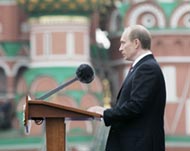Bush calls Georgia a beacon of liberty
US President George Bush has hailed Georgia as a beacon of liberty and, in a swipe at Moscow, said the sovereignty of the ex-Soviet republic must be respected.

Tens of thousands of people jammed into Tbilisi’s Freedom Square on Tuesday to cheer Bush at the rallying point for a 2003 Rose Revolution that brought pro-Western President Mikhail Saakashvili to power.
Bush threw his weight behind Georgia’s efforts to gain the return of two pro-Moscow rebel regions, South Ossetia and Abkhazia, which Saakashvili says is vital for his country to recover from years of economic decline.
But Bush significantly avoided open backing for Saakashvili in his demand for the speedy closure of two Russian bases on Georgian soil.
Aware that Georgia’s fledging democracy feels intimidated by neighbouring Moscow, Bush said Washington encouraged Georgia’s closer cooperation with Nato.
And he got some of his loudest cheers when he said: “The sovereignty and territorial integrity of Georgia must be respected … by all nations.”
Cheering crowds
The US-educated Saakashvili asked for Washington’s help in joining the list of other ex-Soviet states to join Nato, saying: “Democracy for our society is a natural attribute and we will defend it as we do our national identity.”
“You gathered here armed with nothing but roses and the power of your convictions, and you claimed your liberty. And because you acted Georgia is today both sovereign and free and a beacon of liberty for this region and the world” US President George Bush |
The crowd, squeezed into the square and flowing beyond it, responded enthusiastically to the first visit by a sitting US president to the mountainous Caucasus state. Estimates of their numbers ranged from at least 60,000 to well over 100,000.
As the two leaders appeared on the makeshift stage, the crowd chanted “Misha, Misha!” – the short form of Saakashvili’s first name – and then “Bushi, Bushi!” the Georgian language version of the US president’s name.
Grenade
A hand grenade was discovered near Bush during his joint appearance with the Georgian leader at a rally in Tbilisi, but was not in a position to explode, a top Georgian security official said on Wednesday.
“The grenade was not in the armed position,” he said, and “there was no threat to the presidents. The aim was to scare people to get media attention,” said Gela Bezhuashvili, secretary of Georgia‘s national security council.
Struggle
Bush recalled Georgia’s long struggle for independence that led to the People Power revolution of November 2003.
“You gathered here armed with nothing but roses and the power of your convictions, and you claimed your liberty. And because you acted, Georgia is today both sovereign and free and a beacon of liberty for this region and the world,” he said.
The Caucasus is home to a string of local conflicts arising from the collapse of the Soviet Union.
Georgia borders Russia’s troubled Chechnya region and is on the route for a US-backed pipeline linking Caspian Sea oilfields to world markets.
Regional conflicts
Bush told Saakashvili that he could telephone him any time to seek help on the disputes over the rebel regions, but suggested international bodies such as the United Nations also be brought in to solve the issue peacefully.
“The Georgian president has put a way forward that encourages autonomy and self-government but does not encourage dividing up this great country. This seems to me … to be a very reasonable proposition,” he said.
|
“Democracy for our society is a natural attribute and we will defend it as we do our national identity” Mikhail Saakashvili, |
Bush said the disputes should be resolved between the Georgian government and the separatist regions. “The United States cannot impose a solution nor would you want us to,” he added.
In reply to a question, Bush avoided support for Georgia in its dispute with the Kremlin over the Soviet-era Russian bases on its soil, which Saakashvili has likened to an occupation.
Bush said he had discussed the issue with Russian President Vladimir Putin, who had responded that his government was working to fulfill its obligations under an earlier agreement to eventually close the bases.
“That is an important commitment for the people of Georgia to hear,” Bush said in remarks likely to disappoint Saakashvili.
The Georgian leader snubbed Moscow‘s lavish second world war anniversary party on Monday – which Bush attended – in protest against Russia’s failure to agree on withdrawal of its bases, which house about 3000 troops.
Total nonsense
Meanwhile, Russian President Vladimir Putin, stung by suggestions his nation should apologise for the Soviet Union’s occupation of the Baltic states, has called a border claim by EU-member Latvia “total nonsense”.
Russia has yet to sign a border-delineation agreement with Baltic neighbours Latvia and Estonia, a move that has been repeatedly delayed by poor relations between Moscow and the Baltics – former Soviet republics.
 |
|
Putin has dismissed the Baltic |
“We are ready to sign the agreement on border… with Estonia and Latvia,” Putin said on Tuesday. “We hope they will not be accompanied by idiotic – in terms of their content – demands of a territorial nature.”
“We are ready to wait while our colleagues who came up with this sort of fantasy become mature for real work and will be really ready to sign these documents,” he said, adding that Russia had no border dispute with Estonia .
Estonia and Lithuania both boycotted Monday’s second world war celebrations in protest at Russia’s insistence that the Soviet Union acted as a liberator rather than occupier in the Baltic states after the war.
The border dispute with Latvia hinges on a 1920 treaty between Soviet Russia and Latvia. In the pact, the Russians renounced claims on Latvian territory, which at the time included the Abrene district, annexed by Moscow in 1945.